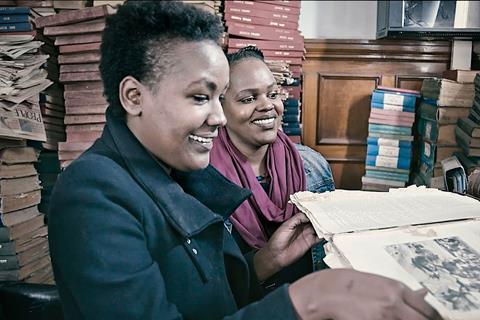The restoration of a fading colonial-era library in Kenya proves to be a touchpoint for the country’s issues

Dirs: Maia Lekow, Chris King. 2024. Kenya. 103mins
If knowledge is power, then libraries must be defended at all costs. That’s the mindset of Nairobi residents Angela Wachuka and Shiro Koinange, longtime friends who have taken it upon themselves to renovate the Kenyan capital’s fading, severely neglected colonial-era McMillan Memorial Library — and in the process reclaim it for an independent Black country. Over the course of seven years, their idealism is challenged by a lack of funding, corrupt and self-serving local politics and a surprising pushback against change. Tracing all this, How To Build A Library becomes a fascinating look at the power of individual action, and a thought-provoking study of colonisation, freedom and representation.
One hell of a protest story
This is the second feature documentary from Kenyan filmmaker Maia Lekow and her Australian-born co-director and husband Chris King, whose The Letter was Kenya’s official Oscar entry in 2021. Powered by the energy of its two immensely likeable subjects, the film should prove an audience pleaser when it makes its debut in the World Cinema Documentary strand at Sundance – which is also premiering the Sarah Jessica Parker-produced The Librarians about book bans across the USA. With libraries increasingly under threat from right-wing ideology and lack of funding, How To Build A Library should strike a timely chord and, like its predecessor, embark on a healthy festival run.
We first meet Wachuka and Koinange in 2017 as, through their non-profit organisation Book Bunk, they embark on their journey to transform Nairobi’s McMillan library from run-down relic to thriving community hub, taking over its management from the County Government of Nairobi which has neglected the building for years. They are shouldering the costs themselves without any guarantee of long-term security; attempts to extend the original five-year management contract with the county make for an ongoing, emotional battle.
But this is more than a passion project for Wachuka and Koinange; it’s an attempt to right the wrongs of history. The McMillan library — the second oldest in Kenya — was built by a British-American settler family to honour patriarch Sir William Northrup McMillan, and opened in 1931 for the exclusive use of white European patrons. It wasn’t until 1958, as Kenya approached independence, that the library became open to all. Yet, as evidenced by the camera’s initial slow sweep of its contents, the library remained a memorial to colonial Africa. When we first step inside, there is not an African author to be found on its groaning bookshelves.
As Wachuka and Koinange set about overhauling this dusty building — together with two of its suburban branches — into a thriving community hub (funded, notably, from overseas funds and benefactors including the British Council) the camera is there at every step. And as the team begins to catalogue the library’s treasure trove of archive materials, which have thus far been unceremoniously boxed up in the basement, the filmmakers deftly weave in snippets of contextual archive footage — the pre-independence riots of the early 1960s, Kenya’s first president Jomo Kenyatta, the 1969 assassination of influential trade unionist Tom Mboya. The country would seem to have come so far and yet, as Wachuka and Koinange discover, the old ways still hold firm. Editing from Lekow, King and Richard Acosta emphasises the stronghold of the past, and the endless institutional hurdles that must be overcome.
The established librarians, for example, cling onto the Dewey Decimel System; European categorisation that has an extreme bias towards white male writers. The library must host a visit from King Charles in order to increase its profile and prove its value to the county government; a colonial throwback that is not lost on Wachuka and Koinange. And, despite numerous promises, the county will only extend its contract with Book Bunk if the county is given control of (and exclusively profits from) the planned cafe and toilets, so taking potentially lucrative sources of revenue away from the library. And through it all, the unwavering determination of these two women makes for one hell of a protest story.
Production company: Circle And Square Productions
International sales: Circle And Square Productions, circleandsquare@gmail.com
Producers: Christopher King, Maia Lekow
Cinematography: Christopher King, Emma Nzioka, Nyasha Kadandara, Michael Onyiego, Peter ‘Slim’ Gitonga, Amit Ramrakha, Wambui ‘Bo’ Muigai, Ronald Ronics, Timothy Mwaura, Leon Malu, Stephen Ruiyi, Joe Mwihia
Editing: Christopher King, Ricardo Acosta, Maia Lekow
Music: Katya Mihailova, Maia Lekow, Ken Myhr, Daniel Hoffknecht






![The Brightest SunScreen[Courtesy HKIFF]](https://d1nslcd7m2225b.cloudfront.net/Pictures/274x183/3/5/0/1448350_thebrightestsunscreencourtesyhkiff_312678.jpg)















![The Brightest SunScreen[Courtesy HKIFF]](https://d1nslcd7m2225b.cloudfront.net/Pictures/100x67/3/5/0/1448350_thebrightestsunscreencourtesyhkiff_312678.jpg)


No comments yet